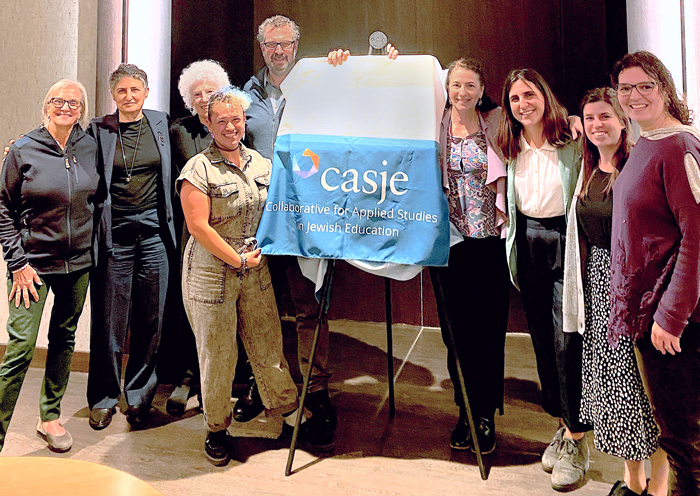About
CASJE (Collaborative for Applied Studies in Jewish Education) is an evolving community of researchers, practitioners, and philanthropic leaders dedicated to improving the quality of knowledge that can be used to guide the work of Jewish Education.
Currently, the field of Jewish education lacks a robust evidence base of useable and shareable knowledge that can inform and advance Jewish educational practice as well as investment of financial resources. Our organization is a first-of-its-kind effort to coordinate the work of a diverse range of researchers, practitioners, and funders who believe that evidence should drive decision-making in Jewish education. To this end, CASJE helps to develop applied research programs focused on high-priority issues facing Jewish education.
CASJE is housed at the George Washington University in the Graduate School of Education and Human Development. Our core operations are supported by generous grants from the Jim Joseph Foundation and Crown Family Philanthropies.
Mission
CASJE's mission is to strengthen Jewish education through the development and use of high-quality applied research. We strive to make research more rigorous, meaningful, and usable by cultivating partnerships, building capacity, and advancing professional learning.
Vision
CASJE envisions a world in which Jewish education research produces meaningful, reliable, and usable evidence that enables Jewish communities to achieve their highest aspirations for Jewish life and learning.
Guiding Principles
CASJE works toward achieving our vision and implementing our mission of improving the quality of knowledge that guides educational practice and policy by:
- Identifying and addressing impactful questions of practice and policy
- Facilitating research in support of evidence-informed decision making rooted in empirical data
- Integrating diverse expertise from within Jewish education, general education and adjacent fields
- Developing interdisciplinary approaches to applied research by supporting collaboration across institutions, and building a shared evidence base
- Building the capacity of Jewish educational institutions to use applied research, working to build a culture of continuous improvement across the field
What is Applied Research?
Applied research aims to solve practical problems. Researchers and practitioners in a given field conduct research on and apply their findings to a specific issue. The goal of all applied research is to yield “actionable knowledge” to improve practice in that field.
Applied research in general education might focus on the importance of play in children’s learning or how classroom activities can be structured around moral and emotional development goals.
In Jewish education, research that studies the ins and outs of Havruta (pair) learning yields practical pedagogical tools for text study applicable to teachers of all disciplines.
Examples of our work include:
An infographic, that showcases research findings on Early Childhood Education in an accessible manner for practitioner audiences.
A convening on research use among Jewish education leaders who provide professional development.
An award-winning report on the Career Trajectories of Jewish Educators.
An Applied Research Fellowship that aims to prepare scholars to meet the research needs of Jewish educational and communal organizations.
Promoting Collaboration between Research and Practice
The ‘C’ in CASJE stands for ‘Collaborative’: It defines both our essence and our approach. At CASJE, collaboration is not just a concept; it’s the cornerstone of our mission. CASJE is a unique initiative that brings together a diverse community of researchers, practitioners, and funders who share the conviction that research evidence can be used to guide the work of Jewish education. We strive to foster collaborative efforts to develop and support applied research addressing crucial issues within Jewish education.
Our Commitment to Knowledge Sharing
Knowledge sharing describes an ongoing process, supported by explicitly designed activities, by which professional knowledge, expertise, evidence, experience and skills are elicited, exchanged and considered to advance the understanding and insight of all participants. The conditions for optimal knowledge exchange require ongoing, respectful relationships and interactions that all parties see as beneficial to their work.
CASJE believes that the deliberate cultivation of knowledge sharing makes it more likely that research will generate reliable, meaningful, and useful information and ideas that can be used both to inform practice and policy and to spark new ways of thinking about challenges and opportunities facing Jewish education.
CASJE brings this orientation to all of our core activities, from defining research agendas and identifying high priority researchable questions, developing studies and instruments, engaging stakeholders across research cycle, producing and communicating findings, facilitating meaning-making relevant in local contexts, providing advanced training to researchers, and supporting research use in practice and policy.
History of CASJE
CASJE began in 2011 as a collaboration between the Stanford Graduate School of Education, the AVI CHAI Foundation and Jim Joseph Foundation, and Rosov Consulting. Today CASJE is housed at the George Washington University Graduate School of Education and Human Development. Through a series of conferences and working groups that have convened a wide array of institutions and individuals, we have helped to lay the groundwork for applied research in key areas of the field.
Learn More About CASJE
Meet our leadership team comprised of distinguished professionals and researchers.
Meet the CASJE staff and our affiliated faculty, staff, and partners.
Read testimonials from program participants and advisory board members.



